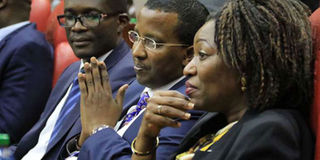Let’s agree that we cannot digitise the integrity of our electoral process

Independent Electoral and Boundaries Commission officials appear before the Parliamentary Joint Select Committee on August 2, 2016 at Parliament Buildings. The latest gimmick is the importance we are encouraged to pay to technology in the conduct of elections. PHOTO | JEFF ANGOTE | NATION MEDIA GROUP
What you need to know:
- The bigger problem is the culture we have nurtured over time among our politicians, many whom are turncoats per excellence.
- No doubt technology has a role; it speeds up processes and provides accuracy. But as Mr John Githongo argued elsewhere, you cannot digitise integrity.
Nothing that our politicians do surprises me any more. I imagine that this is the case for most Kenyans.
Our collective outrage towards politicians has been expressed many times over.
But the staying power of the misbehaviour associated with our Members of Parliament, in particular, has been surprising; it has, in fact, outlived the outrage mobilised around the ‘Mpigs’ narrative. ‘Mpigs’ is now something we utter in jest.
I am prompted to this issue because of the reaction that MPs expressed about the 2016 Election Laws (Amendment) Bill.
The Bill has a provision barring party-hopping, a provision that was opposed by many MPs.
Even opposition politicians loudly demanded an amendment to that provision.
Wise counsel would suggest that their status as the opposition; indeed, as government in waiting, should have led them to support the Bill.
But they had to be whipped, like their Jubilee coalition counterparts, to accept a common sense law.
This situation does indicate why our single-minded focus on IEBC team as the main problem affecting the integrity of our electoral process is one-sided.
The challenge to the integrity of our electoral process is multifaceted.
It stems from a broader problem of the values we carry into state institutions when we are appointed into those positions.
A similar observation can be made about the much-maligned Ethics and Anti-Corruption Commission.
The legal framework guiding the conduct of elections has improved dramatically since 1997, following the IPPG discussions.
But when those discussions were held, they were forced on the Kanu incumbent.
BIGGER PROBLEM
The idea for Kanu was to manage the discussions to a point where the incumbent would ambush the opposition into the 1997 elections.
Both Senator Kiraitu Murungi and former Chief Justice Willy Mutunga have written on this.
At the time, we seemed convinced that President Daniel Moi was the problem. But, in fact, these were only a small part of the problem.
The bigger problem is the culture we have nurtured over time among our politicians, many whom are turncoats per excellence.
Dr Mutunga even argues that some within civil society used the anti-Kanu rhetoric and civil society simply as an avenue to political office.
Since then, Mr Murungi has equated political parties to matatus, arguing that when you miss one, you take the next.
This Murungi illogic is pervasive and was conversed this week.
The names of those who argued in favour of party-hoping, included some who recently perfected the art of quitting their party on no ground at all except in the name of some primordial tribal unity.
With political turncoats making decisions about the legal framework guiding the electoral process, you should spot the gimmick politicians often indulge in to confuse Kenyans.
The latest gimmick is the importance we are encouraged to pay to technology in the conduct of elections.
No doubt technology has a role; it speeds up processes and provides accuracy. But as Mr John Githongo argued elsewhere, you cannot digitise integrity.
INTEGRITY
Technology is a creation of human beings. When you have people without integrity running the show, they channel into technology the outcome they want.
This happened in 2013 elections in Kenya. Contrast this with the way Prof Attahiru Jega managed the last General Election in Nigeria and you realise that depending on the character and confidence of the people managing elections, technology will do exactly what you want it to do.
In other words, our challenge around electoral laws and the integrity of the process must be broadly conceptualised.
The focus must rightly be on IEBC as the election management body; but it must also be on politicians who believe that parties are like matatus or on civil society and the media; these institutions willing or unwillingly give credibility to electoral outcomes, but the question remains if they have earned the roles they play and can they be trusted to facilitate free, fair and legitimate elections?
Godwin R. Murunga is a senior research fellow in the Institute for Development Studies, University of Nairobi





